Gibbs Reflective Model: Analyzing Healthcare Consumer Interaction
VerifiedAdded on 2023/06/04
|12
|3192
|419
Essay
AI Summary
This essay explores the application of the Gibbs Reflective Model to a healthcare consumer's narrative, focusing on a heart failure patient's experience. The essay details the patient's journey from initial symptoms to heart transplant and recovery, highlighting the emotional, psychological, and physical challenges faced. Using the Gibbs Model's stages—Description, Feelings, Evaluation, Analysis, and Conclusion—the author reflects on the interaction, analyzing its impact on their professional development as a healthcare provider. The reflection covers the importance of early diagnosis, comprehensive patient care, and effective communication, emphasizing the role of empathy and psychological support in improving patient outcomes. The essay concludes that understanding the patient's perspective and fostering resilience are critical components of quality healthcare.
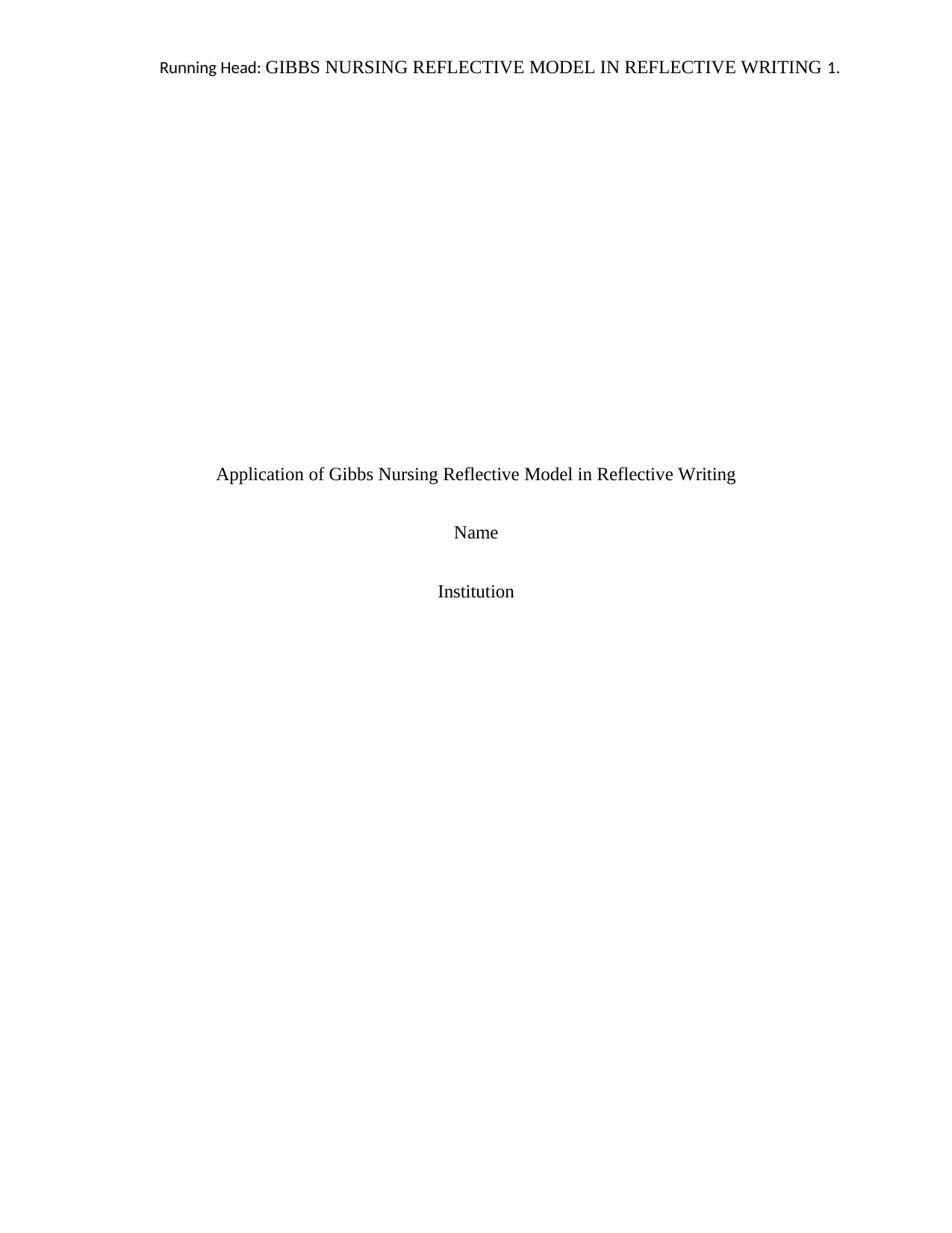
Running Head: GIBBS NURSING REFLECTIVE MODEL IN REFLECTIVE WRITING 1.
Application of Gibbs Nursing Reflective Model in Reflective Writing
Name
Institution
Application of Gibbs Nursing Reflective Model in Reflective Writing
Name
Institution
Paraphrase This Document
Need a fresh take? Get an instant paraphrase of this document with our AI Paraphraser
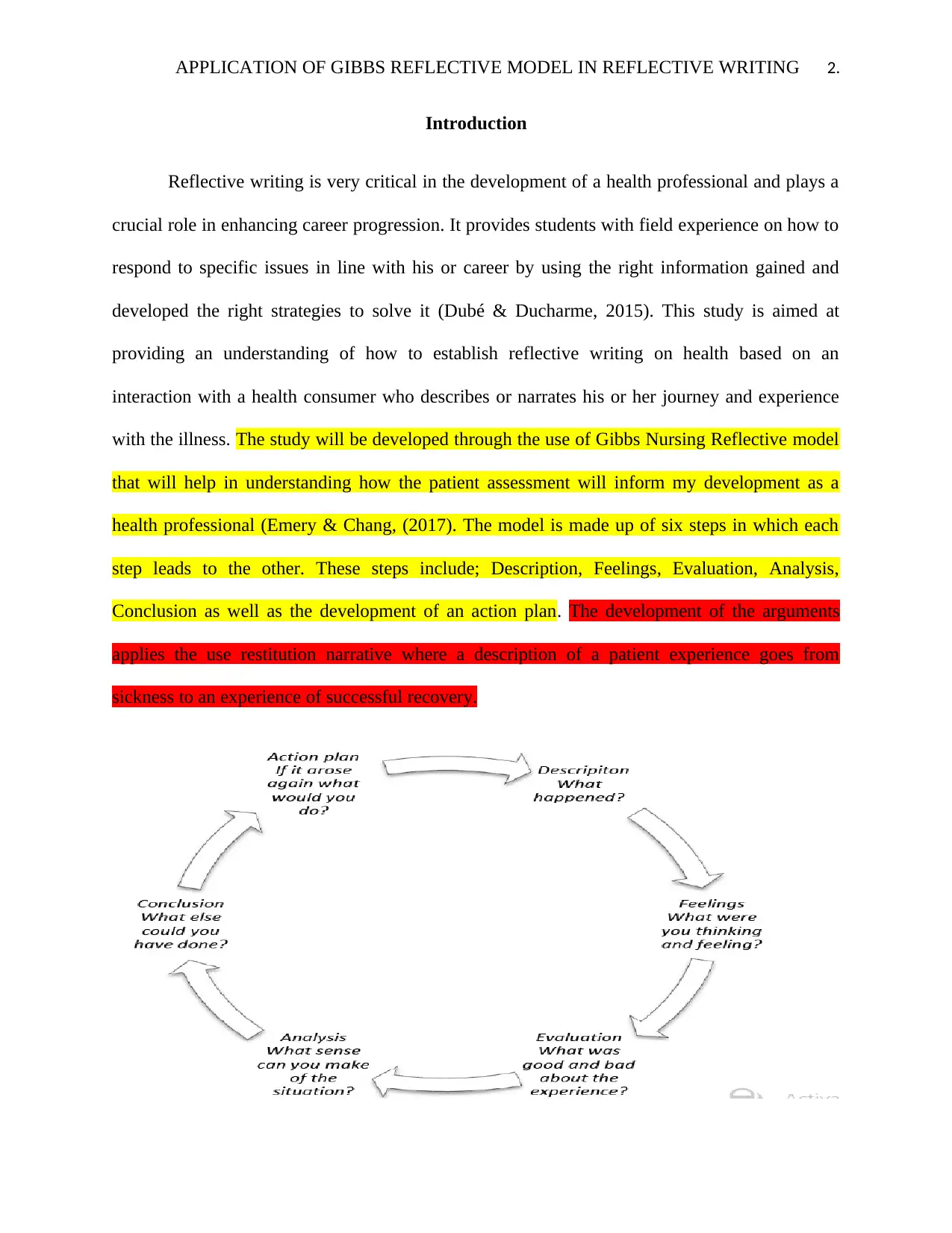
APPLICATION OF GIBBS REFLECTIVE MODEL IN REFLECTIVE WRITING 2.
Introduction
Reflective writing is very critical in the development of a health professional and plays a
crucial role in enhancing career progression. It provides students with field experience on how to
respond to specific issues in line with his or career by using the right information gained and
developed the right strategies to solve it (Dubé & Ducharme, 2015). This study is aimed at
providing an understanding of how to establish reflective writing on health based on an
interaction with a health consumer who describes or narrates his or her journey and experience
with the illness. The study will be developed through the use of Gibbs Nursing Reflective model
that will help in understanding how the patient assessment will inform my development as a
health professional (Emery & Chang, (2017). The model is made up of six steps in which each
step leads to the other. These steps include; Description, Feelings, Evaluation, Analysis,
Conclusion as well as the development of an action plan. The development of the arguments
applies the use restitution narrative where a description of a patient experience goes from
sickness to an experience of successful recovery.
Introduction
Reflective writing is very critical in the development of a health professional and plays a
crucial role in enhancing career progression. It provides students with field experience on how to
respond to specific issues in line with his or career by using the right information gained and
developed the right strategies to solve it (Dubé & Ducharme, 2015). This study is aimed at
providing an understanding of how to establish reflective writing on health based on an
interaction with a health consumer who describes or narrates his or her journey and experience
with the illness. The study will be developed through the use of Gibbs Nursing Reflective model
that will help in understanding how the patient assessment will inform my development as a
health professional (Emery & Chang, (2017). The model is made up of six steps in which each
step leads to the other. These steps include; Description, Feelings, Evaluation, Analysis,
Conclusion as well as the development of an action plan. The development of the arguments
applies the use restitution narrative where a description of a patient experience goes from
sickness to an experience of successful recovery.
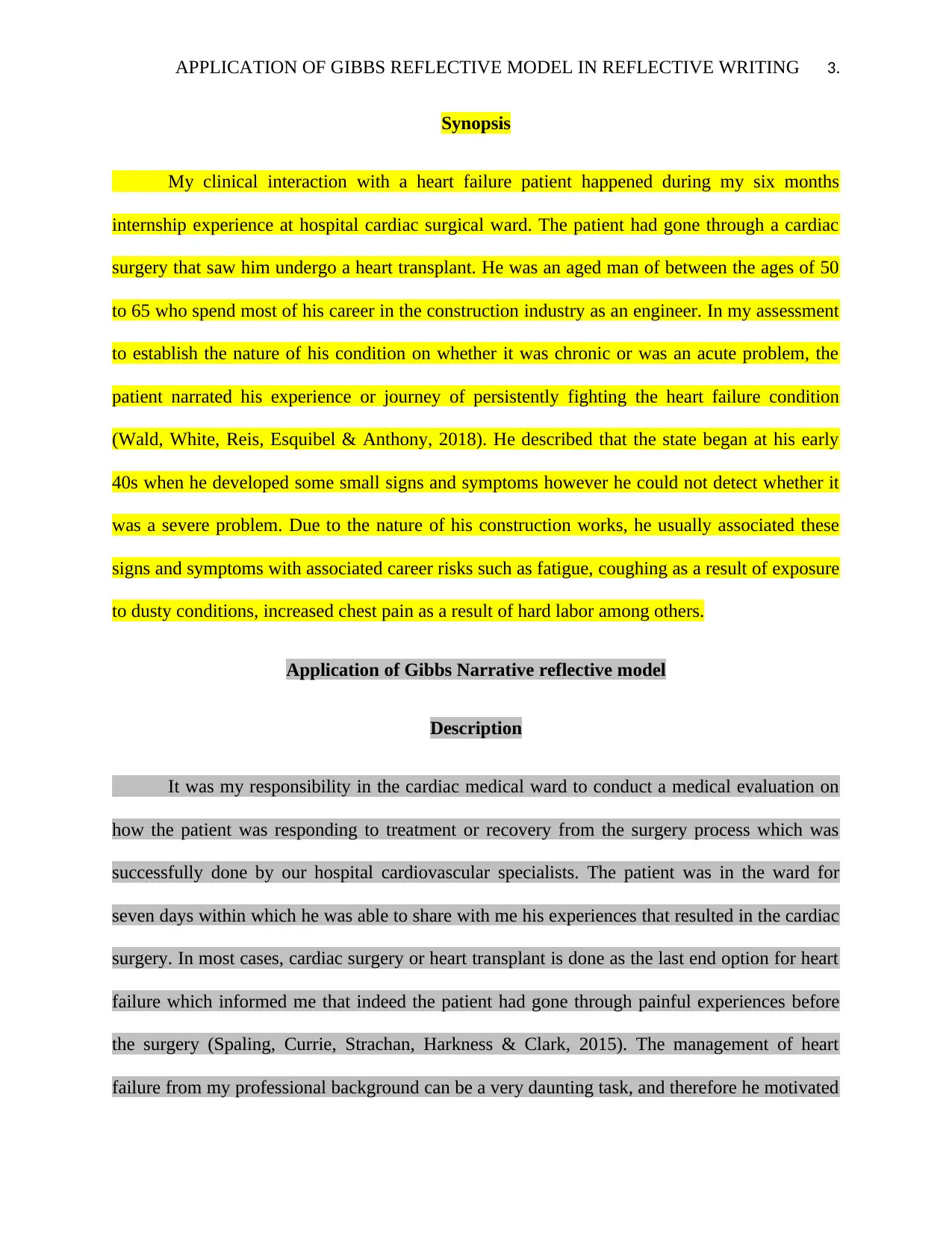
APPLICATION OF GIBBS REFLECTIVE MODEL IN REFLECTIVE WRITING 3.
Synopsis
My clinical interaction with a heart failure patient happened during my six months
internship experience at hospital cardiac surgical ward. The patient had gone through a cardiac
surgery that saw him undergo a heart transplant. He was an aged man of between the ages of 50
to 65 who spend most of his career in the construction industry as an engineer. In my assessment
to establish the nature of his condition on whether it was chronic or was an acute problem, the
patient narrated his experience or journey of persistently fighting the heart failure condition
(Wald, White, Reis, Esquibel & Anthony, 2018). He described that the state began at his early
40s when he developed some small signs and symptoms however he could not detect whether it
was a severe problem. Due to the nature of his construction works, he usually associated these
signs and symptoms with associated career risks such as fatigue, coughing as a result of exposure
to dusty conditions, increased chest pain as a result of hard labor among others.
Application of Gibbs Narrative reflective model
Description
It was my responsibility in the cardiac medical ward to conduct a medical evaluation on
how the patient was responding to treatment or recovery from the surgery process which was
successfully done by our hospital cardiovascular specialists. The patient was in the ward for
seven days within which he was able to share with me his experiences that resulted in the cardiac
surgery. In most cases, cardiac surgery or heart transplant is done as the last end option for heart
failure which informed me that indeed the patient had gone through painful experiences before
the surgery (Spaling, Currie, Strachan, Harkness & Clark, 2015). The management of heart
failure from my professional background can be a very daunting task, and therefore he motivated
Synopsis
My clinical interaction with a heart failure patient happened during my six months
internship experience at hospital cardiac surgical ward. The patient had gone through a cardiac
surgery that saw him undergo a heart transplant. He was an aged man of between the ages of 50
to 65 who spend most of his career in the construction industry as an engineer. In my assessment
to establish the nature of his condition on whether it was chronic or was an acute problem, the
patient narrated his experience or journey of persistently fighting the heart failure condition
(Wald, White, Reis, Esquibel & Anthony, 2018). He described that the state began at his early
40s when he developed some small signs and symptoms however he could not detect whether it
was a severe problem. Due to the nature of his construction works, he usually associated these
signs and symptoms with associated career risks such as fatigue, coughing as a result of exposure
to dusty conditions, increased chest pain as a result of hard labor among others.
Application of Gibbs Narrative reflective model
Description
It was my responsibility in the cardiac medical ward to conduct a medical evaluation on
how the patient was responding to treatment or recovery from the surgery process which was
successfully done by our hospital cardiovascular specialists. The patient was in the ward for
seven days within which he was able to share with me his experiences that resulted in the cardiac
surgery. In most cases, cardiac surgery or heart transplant is done as the last end option for heart
failure which informed me that indeed the patient had gone through painful experiences before
the surgery (Spaling, Currie, Strachan, Harkness & Clark, 2015). The management of heart
failure from my professional background can be a very daunting task, and therefore he motivated
⊘ This is a preview!⊘
Do you want full access?
Subscribe today to unlock all pages.

Trusted by 1+ million students worldwide
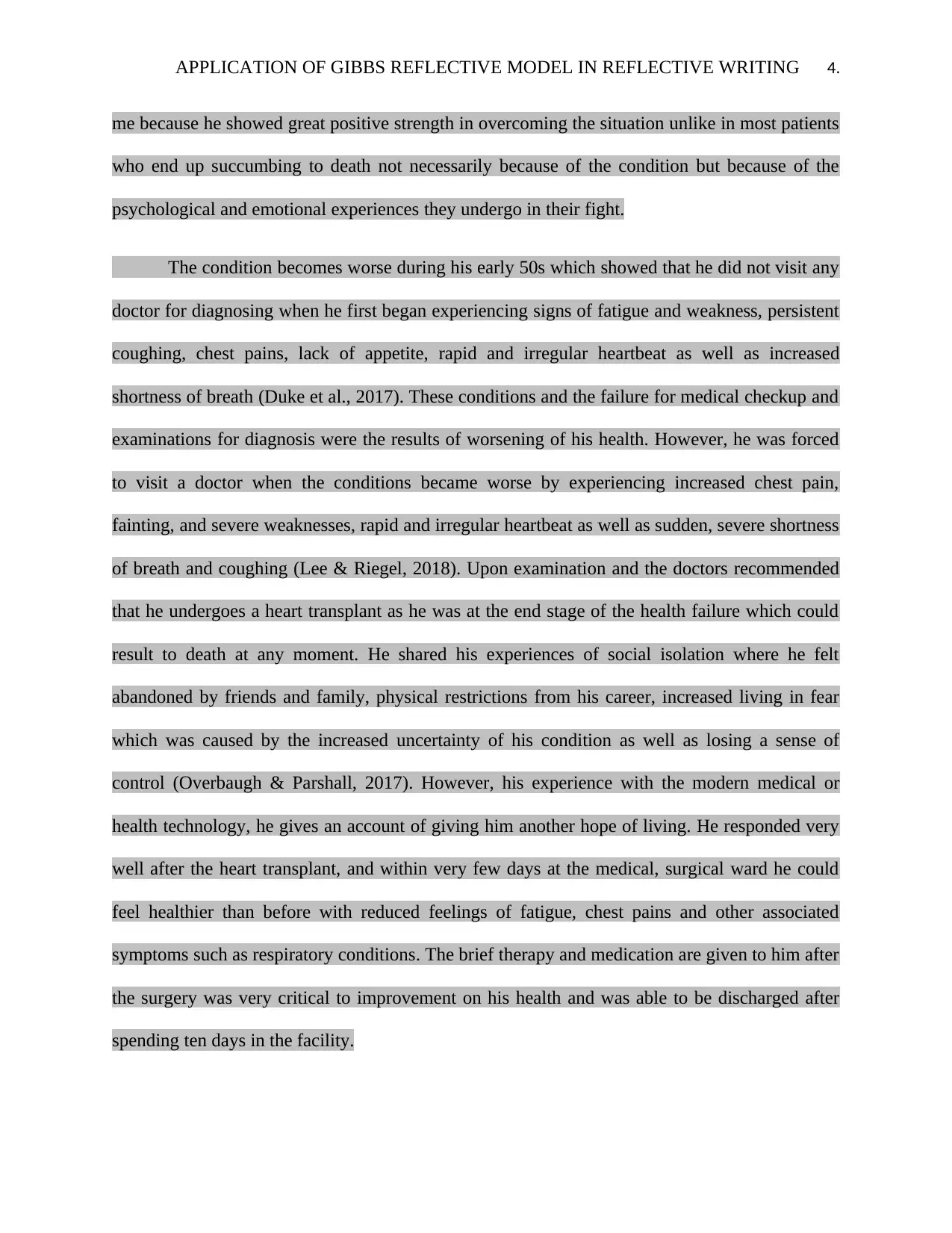
APPLICATION OF GIBBS REFLECTIVE MODEL IN REFLECTIVE WRITING 4.
me because he showed great positive strength in overcoming the situation unlike in most patients
who end up succumbing to death not necessarily because of the condition but because of the
psychological and emotional experiences they undergo in their fight.
The condition becomes worse during his early 50s which showed that he did not visit any
doctor for diagnosing when he first began experiencing signs of fatigue and weakness, persistent
coughing, chest pains, lack of appetite, rapid and irregular heartbeat as well as increased
shortness of breath (Duke et al., 2017). These conditions and the failure for medical checkup and
examinations for diagnosis were the results of worsening of his health. However, he was forced
to visit a doctor when the conditions became worse by experiencing increased chest pain,
fainting, and severe weaknesses, rapid and irregular heartbeat as well as sudden, severe shortness
of breath and coughing (Lee & Riegel, 2018). Upon examination and the doctors recommended
that he undergoes a heart transplant as he was at the end stage of the health failure which could
result to death at any moment. He shared his experiences of social isolation where he felt
abandoned by friends and family, physical restrictions from his career, increased living in fear
which was caused by the increased uncertainty of his condition as well as losing a sense of
control (Overbaugh & Parshall, 2017). However, his experience with the modern medical or
health technology, he gives an account of giving him another hope of living. He responded very
well after the heart transplant, and within very few days at the medical, surgical ward he could
feel healthier than before with reduced feelings of fatigue, chest pains and other associated
symptoms such as respiratory conditions. The brief therapy and medication are given to him after
the surgery was very critical to improvement on his health and was able to be discharged after
spending ten days in the facility.
me because he showed great positive strength in overcoming the situation unlike in most patients
who end up succumbing to death not necessarily because of the condition but because of the
psychological and emotional experiences they undergo in their fight.
The condition becomes worse during his early 50s which showed that he did not visit any
doctor for diagnosing when he first began experiencing signs of fatigue and weakness, persistent
coughing, chest pains, lack of appetite, rapid and irregular heartbeat as well as increased
shortness of breath (Duke et al., 2017). These conditions and the failure for medical checkup and
examinations for diagnosis were the results of worsening of his health. However, he was forced
to visit a doctor when the conditions became worse by experiencing increased chest pain,
fainting, and severe weaknesses, rapid and irregular heartbeat as well as sudden, severe shortness
of breath and coughing (Lee & Riegel, 2018). Upon examination and the doctors recommended
that he undergoes a heart transplant as he was at the end stage of the health failure which could
result to death at any moment. He shared his experiences of social isolation where he felt
abandoned by friends and family, physical restrictions from his career, increased living in fear
which was caused by the increased uncertainty of his condition as well as losing a sense of
control (Overbaugh & Parshall, 2017). However, his experience with the modern medical or
health technology, he gives an account of giving him another hope of living. He responded very
well after the heart transplant, and within very few days at the medical, surgical ward he could
feel healthier than before with reduced feelings of fatigue, chest pains and other associated
symptoms such as respiratory conditions. The brief therapy and medication are given to him after
the surgery was very critical to improvement on his health and was able to be discharged after
spending ten days in the facility.
Paraphrase This Document
Need a fresh take? Get an instant paraphrase of this document with our AI Paraphraser
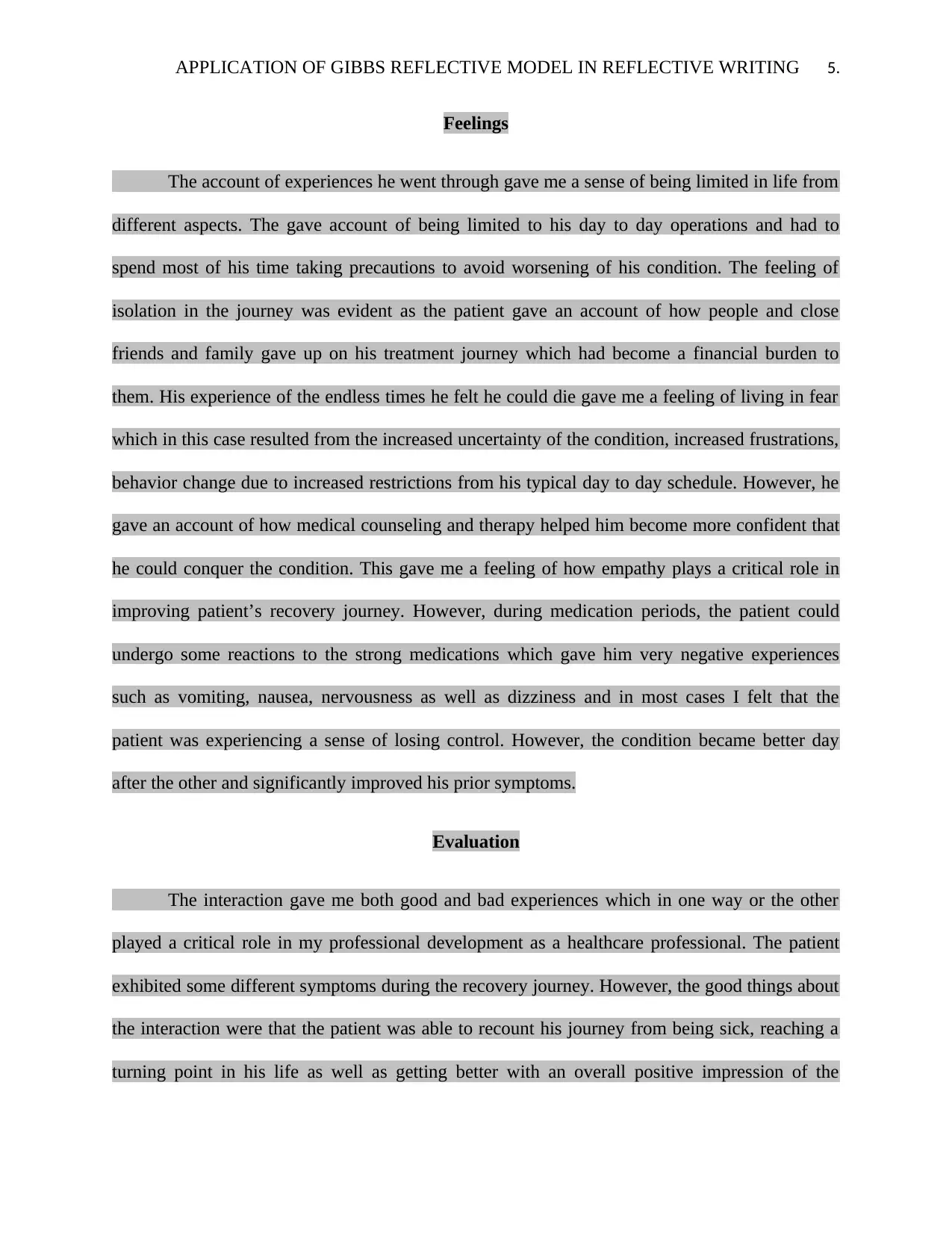
APPLICATION OF GIBBS REFLECTIVE MODEL IN REFLECTIVE WRITING 5.
Feelings
The account of experiences he went through gave me a sense of being limited in life from
different aspects. The gave account of being limited to his day to day operations and had to
spend most of his time taking precautions to avoid worsening of his condition. The feeling of
isolation in the journey was evident as the patient gave an account of how people and close
friends and family gave up on his treatment journey which had become a financial burden to
them. His experience of the endless times he felt he could die gave me a feeling of living in fear
which in this case resulted from the increased uncertainty of the condition, increased frustrations,
behavior change due to increased restrictions from his typical day to day schedule. However, he
gave an account of how medical counseling and therapy helped him become more confident that
he could conquer the condition. This gave me a feeling of how empathy plays a critical role in
improving patient’s recovery journey. However, during medication periods, the patient could
undergo some reactions to the strong medications which gave him very negative experiences
such as vomiting, nausea, nervousness as well as dizziness and in most cases I felt that the
patient was experiencing a sense of losing control. However, the condition became better day
after the other and significantly improved his prior symptoms.
Evaluation
The interaction gave me both good and bad experiences which in one way or the other
played a critical role in my professional development as a healthcare professional. The patient
exhibited some different symptoms during the recovery journey. However, the good things about
the interaction were that the patient was able to recount his journey from being sick, reaching a
turning point in his life as well as getting better with an overall positive impression of the
Feelings
The account of experiences he went through gave me a sense of being limited in life from
different aspects. The gave account of being limited to his day to day operations and had to
spend most of his time taking precautions to avoid worsening of his condition. The feeling of
isolation in the journey was evident as the patient gave an account of how people and close
friends and family gave up on his treatment journey which had become a financial burden to
them. His experience of the endless times he felt he could die gave me a feeling of living in fear
which in this case resulted from the increased uncertainty of the condition, increased frustrations,
behavior change due to increased restrictions from his typical day to day schedule. However, he
gave an account of how medical counseling and therapy helped him become more confident that
he could conquer the condition. This gave me a feeling of how empathy plays a critical role in
improving patient’s recovery journey. However, during medication periods, the patient could
undergo some reactions to the strong medications which gave him very negative experiences
such as vomiting, nausea, nervousness as well as dizziness and in most cases I felt that the
patient was experiencing a sense of losing control. However, the condition became better day
after the other and significantly improved his prior symptoms.
Evaluation
The interaction gave me both good and bad experiences which in one way or the other
played a critical role in my professional development as a healthcare professional. The patient
exhibited some different symptoms during the recovery journey. However, the good things about
the interaction were that the patient was able to recount his journey from being sick, reaching a
turning point in his life as well as getting better with an overall positive impression of the
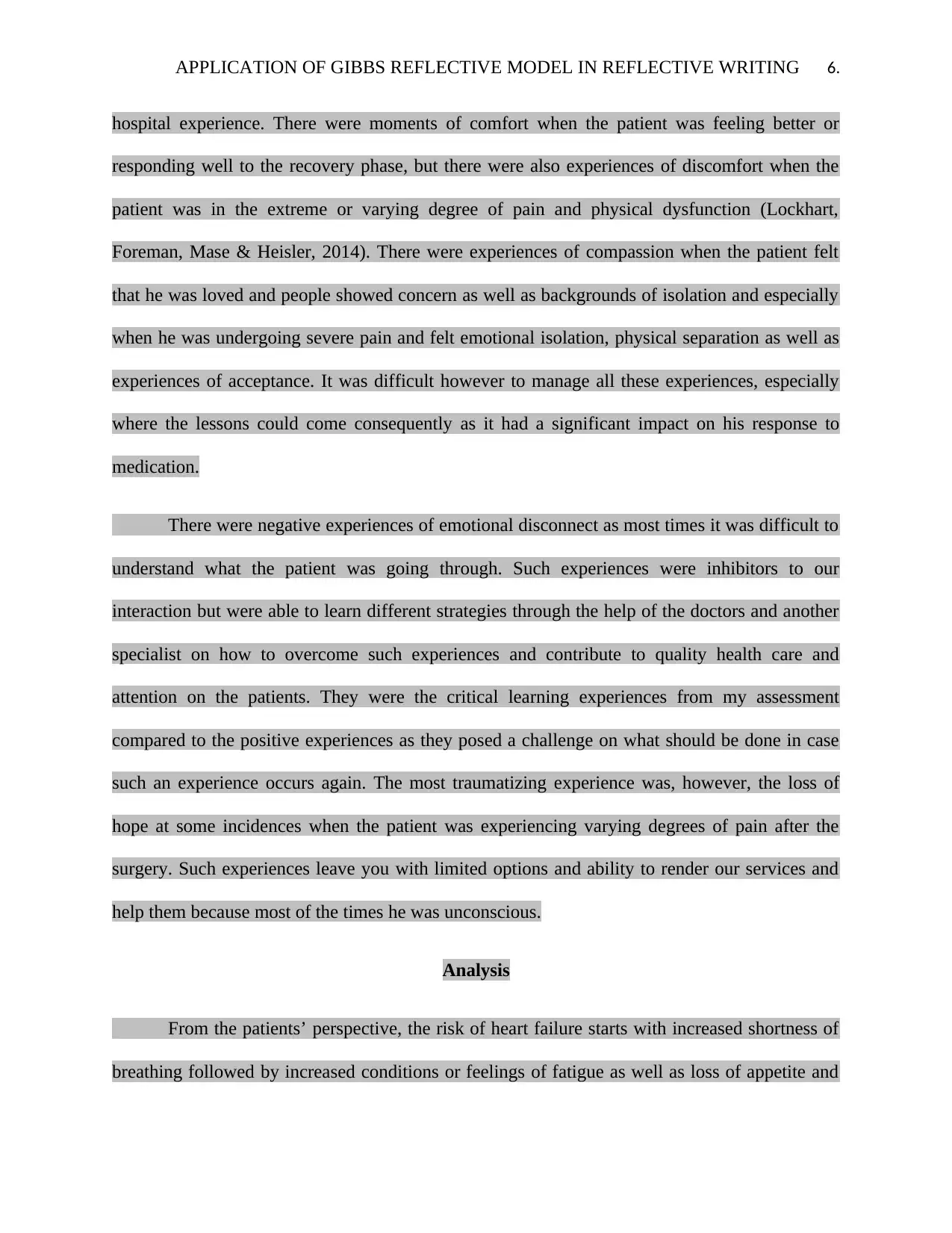
APPLICATION OF GIBBS REFLECTIVE MODEL IN REFLECTIVE WRITING 6.
hospital experience. There were moments of comfort when the patient was feeling better or
responding well to the recovery phase, but there were also experiences of discomfort when the
patient was in the extreme or varying degree of pain and physical dysfunction (Lockhart,
Foreman, Mase & Heisler, 2014). There were experiences of compassion when the patient felt
that he was loved and people showed concern as well as backgrounds of isolation and especially
when he was undergoing severe pain and felt emotional isolation, physical separation as well as
experiences of acceptance. It was difficult however to manage all these experiences, especially
where the lessons could come consequently as it had a significant impact on his response to
medication.
There were negative experiences of emotional disconnect as most times it was difficult to
understand what the patient was going through. Such experiences were inhibitors to our
interaction but were able to learn different strategies through the help of the doctors and another
specialist on how to overcome such experiences and contribute to quality health care and
attention on the patients. They were the critical learning experiences from my assessment
compared to the positive experiences as they posed a challenge on what should be done in case
such an experience occurs again. The most traumatizing experience was, however, the loss of
hope at some incidences when the patient was experiencing varying degrees of pain after the
surgery. Such experiences leave you with limited options and ability to render our services and
help them because most of the times he was unconscious.
Analysis
From the patients’ perspective, the risk of heart failure starts with increased shortness of
breathing followed by increased conditions or feelings of fatigue as well as loss of appetite and
hospital experience. There were moments of comfort when the patient was feeling better or
responding well to the recovery phase, but there were also experiences of discomfort when the
patient was in the extreme or varying degree of pain and physical dysfunction (Lockhart,
Foreman, Mase & Heisler, 2014). There were experiences of compassion when the patient felt
that he was loved and people showed concern as well as backgrounds of isolation and especially
when he was undergoing severe pain and felt emotional isolation, physical separation as well as
experiences of acceptance. It was difficult however to manage all these experiences, especially
where the lessons could come consequently as it had a significant impact on his response to
medication.
There were negative experiences of emotional disconnect as most times it was difficult to
understand what the patient was going through. Such experiences were inhibitors to our
interaction but were able to learn different strategies through the help of the doctors and another
specialist on how to overcome such experiences and contribute to quality health care and
attention on the patients. They were the critical learning experiences from my assessment
compared to the positive experiences as they posed a challenge on what should be done in case
such an experience occurs again. The most traumatizing experience was, however, the loss of
hope at some incidences when the patient was experiencing varying degrees of pain after the
surgery. Such experiences leave you with limited options and ability to render our services and
help them because most of the times he was unconscious.
Analysis
From the patients’ perspective, the risk of heart failure starts with increased shortness of
breathing followed by increased conditions or feelings of fatigue as well as loss of appetite and
⊘ This is a preview!⊘
Do you want full access?
Subscribe today to unlock all pages.

Trusted by 1+ million students worldwide
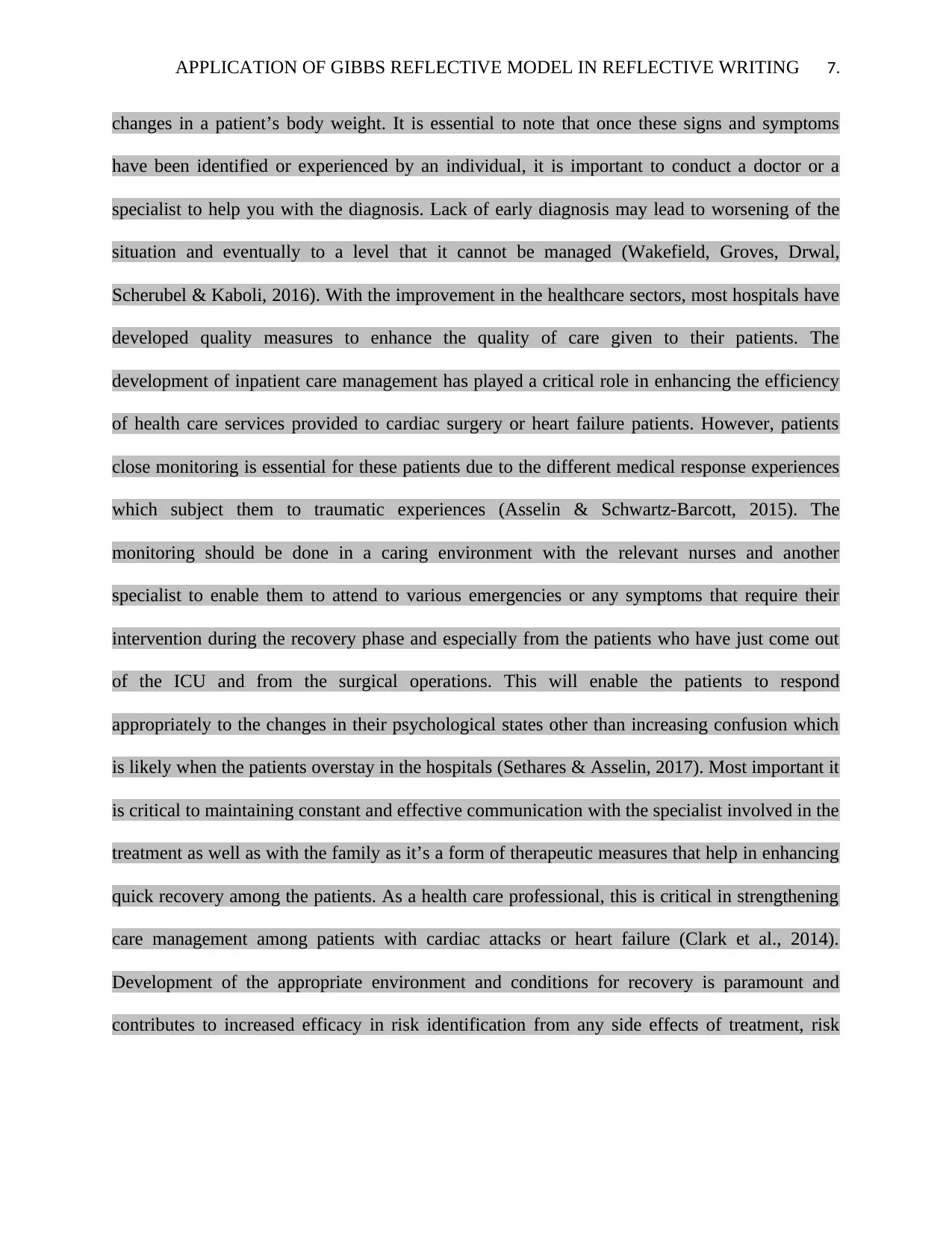
APPLICATION OF GIBBS REFLECTIVE MODEL IN REFLECTIVE WRITING 7.
changes in a patient’s body weight. It is essential to note that once these signs and symptoms
have been identified or experienced by an individual, it is important to conduct a doctor or a
specialist to help you with the diagnosis. Lack of early diagnosis may lead to worsening of the
situation and eventually to a level that it cannot be managed (Wakefield, Groves, Drwal,
Scherubel & Kaboli, 2016). With the improvement in the healthcare sectors, most hospitals have
developed quality measures to enhance the quality of care given to their patients. The
development of inpatient care management has played a critical role in enhancing the efficiency
of health care services provided to cardiac surgery or heart failure patients. However, patients
close monitoring is essential for these patients due to the different medical response experiences
which subject them to traumatic experiences (Asselin & Schwartz-Barcott, 2015). The
monitoring should be done in a caring environment with the relevant nurses and another
specialist to enable them to attend to various emergencies or any symptoms that require their
intervention during the recovery phase and especially from the patients who have just come out
of the ICU and from the surgical operations. This will enable the patients to respond
appropriately to the changes in their psychological states other than increasing confusion which
is likely when the patients overstay in the hospitals (Sethares & Asselin, 2017). Most important it
is critical to maintaining constant and effective communication with the specialist involved in the
treatment as well as with the family as it’s a form of therapeutic measures that help in enhancing
quick recovery among the patients. As a health care professional, this is critical in strengthening
care management among patients with cardiac attacks or heart failure (Clark et al., 2014).
Development of the appropriate environment and conditions for recovery is paramount and
contributes to increased efficacy in risk identification from any side effects of treatment, risk
changes in a patient’s body weight. It is essential to note that once these signs and symptoms
have been identified or experienced by an individual, it is important to conduct a doctor or a
specialist to help you with the diagnosis. Lack of early diagnosis may lead to worsening of the
situation and eventually to a level that it cannot be managed (Wakefield, Groves, Drwal,
Scherubel & Kaboli, 2016). With the improvement in the healthcare sectors, most hospitals have
developed quality measures to enhance the quality of care given to their patients. The
development of inpatient care management has played a critical role in enhancing the efficiency
of health care services provided to cardiac surgery or heart failure patients. However, patients
close monitoring is essential for these patients due to the different medical response experiences
which subject them to traumatic experiences (Asselin & Schwartz-Barcott, 2015). The
monitoring should be done in a caring environment with the relevant nurses and another
specialist to enable them to attend to various emergencies or any symptoms that require their
intervention during the recovery phase and especially from the patients who have just come out
of the ICU and from the surgical operations. This will enable the patients to respond
appropriately to the changes in their psychological states other than increasing confusion which
is likely when the patients overstay in the hospitals (Sethares & Asselin, 2017). Most important it
is critical to maintaining constant and effective communication with the specialist involved in the
treatment as well as with the family as it’s a form of therapeutic measures that help in enhancing
quick recovery among the patients. As a health care professional, this is critical in strengthening
care management among patients with cardiac attacks or heart failure (Clark et al., 2014).
Development of the appropriate environment and conditions for recovery is paramount and
contributes to increased efficacy in risk identification from any side effects of treatment, risk
Paraphrase This Document
Need a fresh take? Get an instant paraphrase of this document with our AI Paraphraser
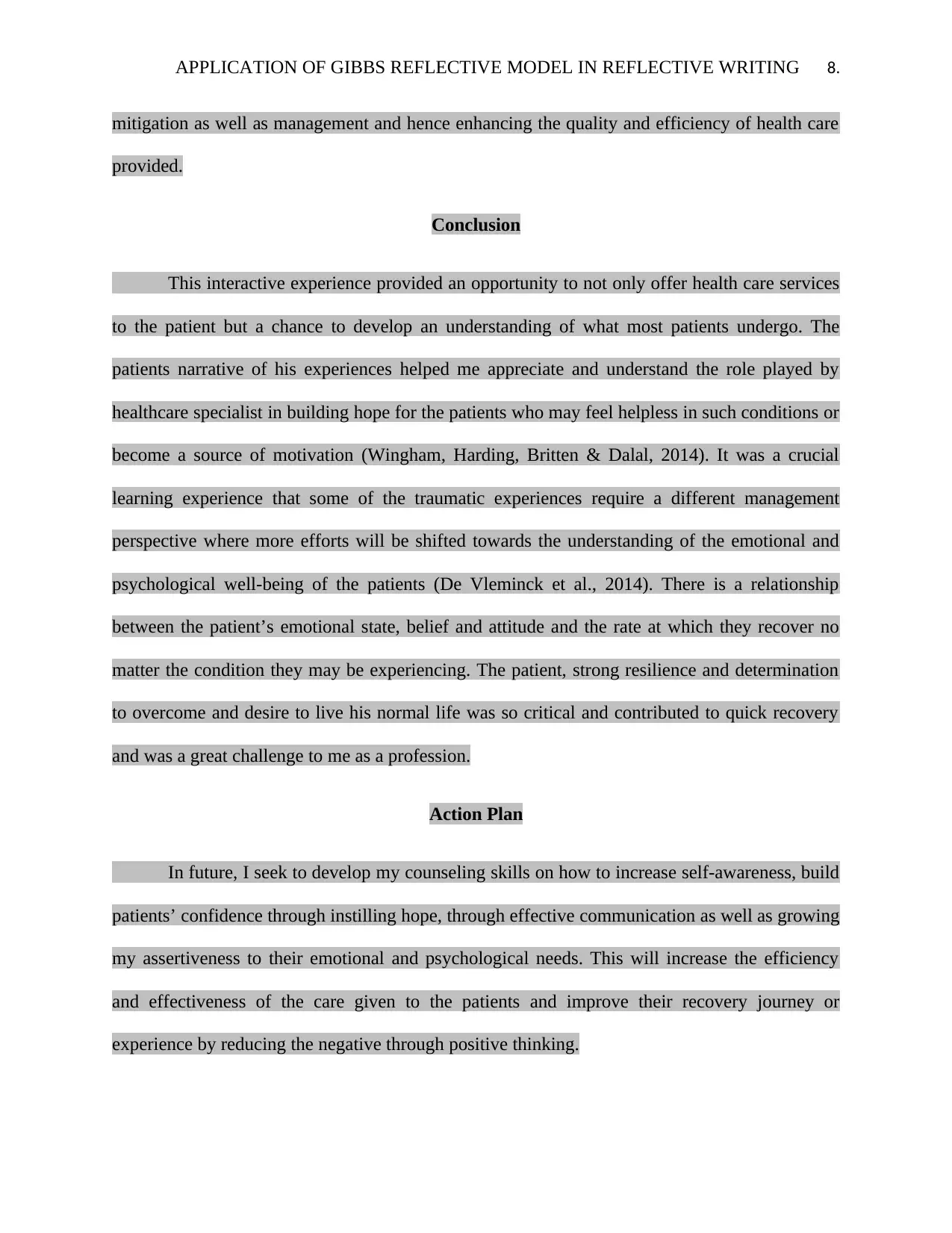
APPLICATION OF GIBBS REFLECTIVE MODEL IN REFLECTIVE WRITING 8.
mitigation as well as management and hence enhancing the quality and efficiency of health care
provided.
Conclusion
This interactive experience provided an opportunity to not only offer health care services
to the patient but a chance to develop an understanding of what most patients undergo. The
patients narrative of his experiences helped me appreciate and understand the role played by
healthcare specialist in building hope for the patients who may feel helpless in such conditions or
become a source of motivation (Wingham, Harding, Britten & Dalal, 2014). It was a crucial
learning experience that some of the traumatic experiences require a different management
perspective where more efforts will be shifted towards the understanding of the emotional and
psychological well-being of the patients (De Vleminck et al., 2014). There is a relationship
between the patient’s emotional state, belief and attitude and the rate at which they recover no
matter the condition they may be experiencing. The patient, strong resilience and determination
to overcome and desire to live his normal life was so critical and contributed to quick recovery
and was a great challenge to me as a profession.
Action Plan
In future, I seek to develop my counseling skills on how to increase self-awareness, build
patients’ confidence through instilling hope, through effective communication as well as growing
my assertiveness to their emotional and psychological needs. This will increase the efficiency
and effectiveness of the care given to the patients and improve their recovery journey or
experience by reducing the negative through positive thinking.
mitigation as well as management and hence enhancing the quality and efficiency of health care
provided.
Conclusion
This interactive experience provided an opportunity to not only offer health care services
to the patient but a chance to develop an understanding of what most patients undergo. The
patients narrative of his experiences helped me appreciate and understand the role played by
healthcare specialist in building hope for the patients who may feel helpless in such conditions or
become a source of motivation (Wingham, Harding, Britten & Dalal, 2014). It was a crucial
learning experience that some of the traumatic experiences require a different management
perspective where more efforts will be shifted towards the understanding of the emotional and
psychological well-being of the patients (De Vleminck et al., 2014). There is a relationship
between the patient’s emotional state, belief and attitude and the rate at which they recover no
matter the condition they may be experiencing. The patient, strong resilience and determination
to overcome and desire to live his normal life was so critical and contributed to quick recovery
and was a great challenge to me as a profession.
Action Plan
In future, I seek to develop my counseling skills on how to increase self-awareness, build
patients’ confidence through instilling hope, through effective communication as well as growing
my assertiveness to their emotional and psychological needs. This will increase the efficiency
and effectiveness of the care given to the patients and improve their recovery journey or
experience by reducing the negative through positive thinking.
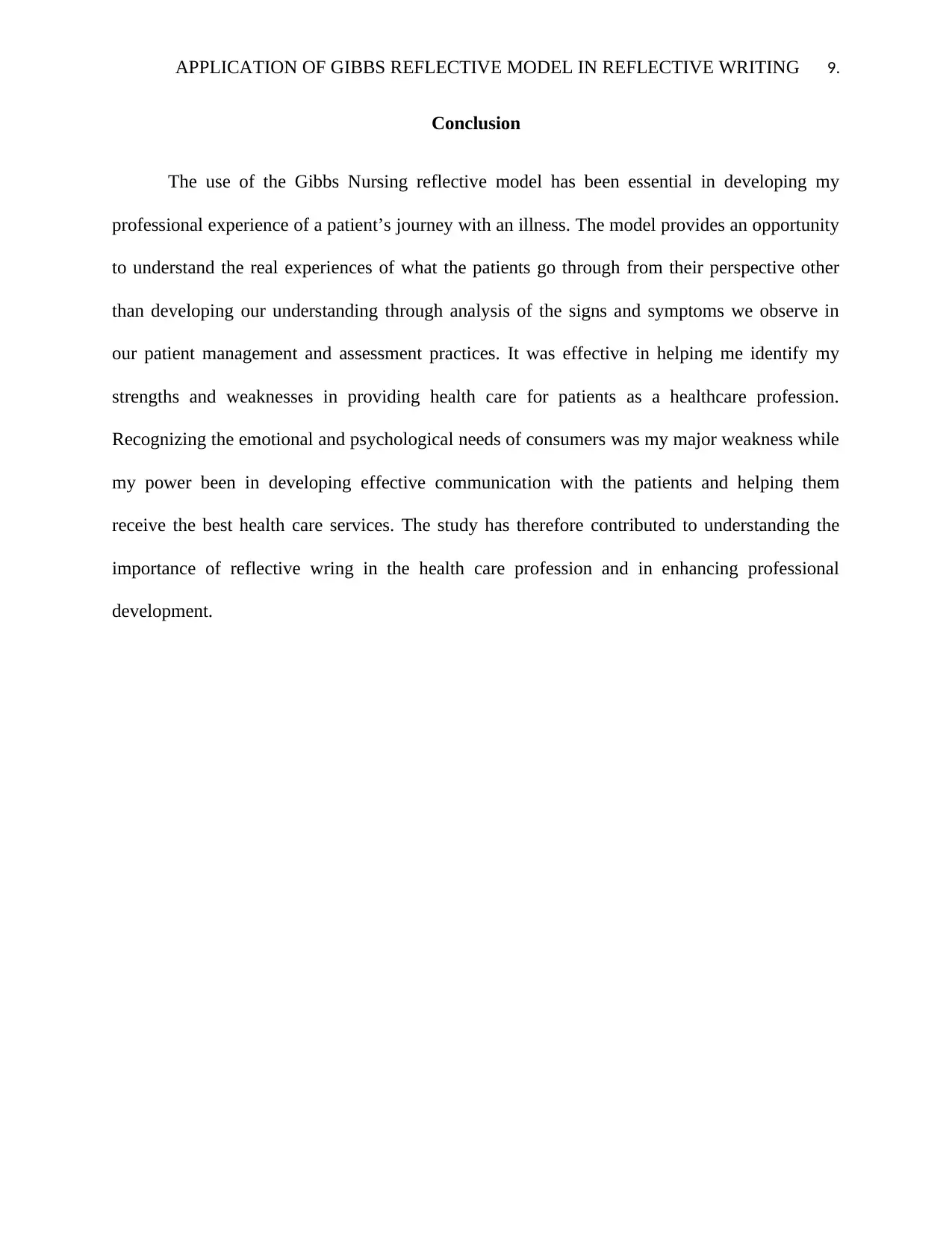
APPLICATION OF GIBBS REFLECTIVE MODEL IN REFLECTIVE WRITING 9.
Conclusion
The use of the Gibbs Nursing reflective model has been essential in developing my
professional experience of a patient’s journey with an illness. The model provides an opportunity
to understand the real experiences of what the patients go through from their perspective other
than developing our understanding through analysis of the signs and symptoms we observe in
our patient management and assessment practices. It was effective in helping me identify my
strengths and weaknesses in providing health care for patients as a healthcare profession.
Recognizing the emotional and psychological needs of consumers was my major weakness while
my power been in developing effective communication with the patients and helping them
receive the best health care services. The study has therefore contributed to understanding the
importance of reflective wring in the health care profession and in enhancing professional
development.
Conclusion
The use of the Gibbs Nursing reflective model has been essential in developing my
professional experience of a patient’s journey with an illness. The model provides an opportunity
to understand the real experiences of what the patients go through from their perspective other
than developing our understanding through analysis of the signs and symptoms we observe in
our patient management and assessment practices. It was effective in helping me identify my
strengths and weaknesses in providing health care for patients as a healthcare profession.
Recognizing the emotional and psychological needs of consumers was my major weakness while
my power been in developing effective communication with the patients and helping them
receive the best health care services. The study has therefore contributed to understanding the
importance of reflective wring in the health care profession and in enhancing professional
development.
⊘ This is a preview!⊘
Do you want full access?
Subscribe today to unlock all pages.

Trusted by 1+ million students worldwide
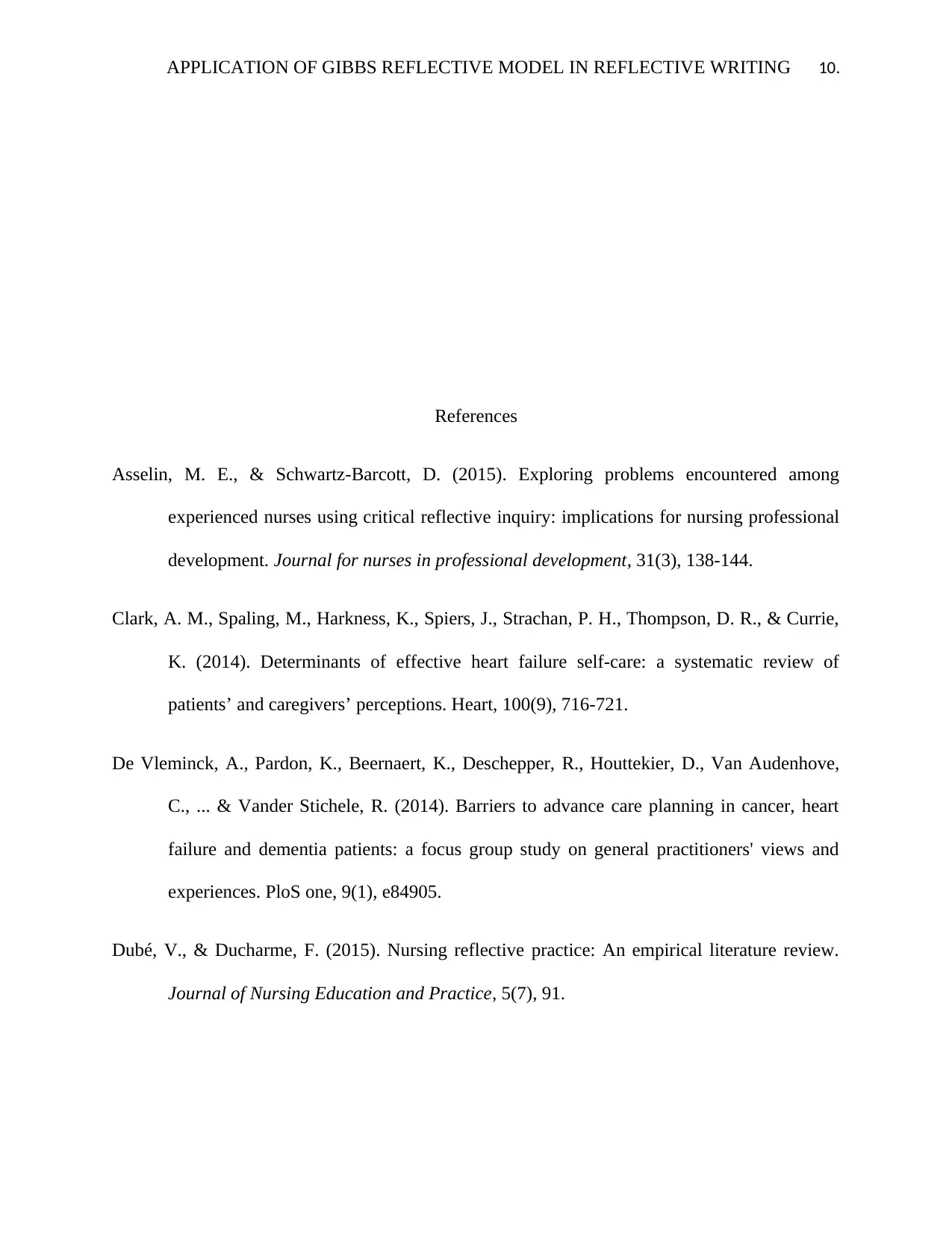
APPLICATION OF GIBBS REFLECTIVE MODEL IN REFLECTIVE WRITING 10.
References
Asselin, M. E., & Schwartz-Barcott, D. (2015). Exploring problems encountered among
experienced nurses using critical reflective inquiry: implications for nursing professional
development. Journal for nurses in professional development, 31(3), 138-144.
Clark, A. M., Spaling, M., Harkness, K., Spiers, J., Strachan, P. H., Thompson, D. R., & Currie,
K. (2014). Determinants of effective heart failure self-care: a systematic review of
patients’ and caregivers’ perceptions. Heart, 100(9), 716-721.
De Vleminck, A., Pardon, K., Beernaert, K., Deschepper, R., Houttekier, D., Van Audenhove,
C., ... & Vander Stichele, R. (2014). Barriers to advance care planning in cancer, heart
failure and dementia patients: a focus group study on general practitioners' views and
experiences. PloS one, 9(1), e84905.
Dubé, V., & Ducharme, F. (2015). Nursing reflective practice: An empirical literature review.
Journal of Nursing Education and Practice, 5(7), 91.
References
Asselin, M. E., & Schwartz-Barcott, D. (2015). Exploring problems encountered among
experienced nurses using critical reflective inquiry: implications for nursing professional
development. Journal for nurses in professional development, 31(3), 138-144.
Clark, A. M., Spaling, M., Harkness, K., Spiers, J., Strachan, P. H., Thompson, D. R., & Currie,
K. (2014). Determinants of effective heart failure self-care: a systematic review of
patients’ and caregivers’ perceptions. Heart, 100(9), 716-721.
De Vleminck, A., Pardon, K., Beernaert, K., Deschepper, R., Houttekier, D., Van Audenhove,
C., ... & Vander Stichele, R. (2014). Barriers to advance care planning in cancer, heart
failure and dementia patients: a focus group study on general practitioners' views and
experiences. PloS one, 9(1), e84905.
Dubé, V., & Ducharme, F. (2015). Nursing reflective practice: An empirical literature review.
Journal of Nursing Education and Practice, 5(7), 91.
Paraphrase This Document
Need a fresh take? Get an instant paraphrase of this document with our AI Paraphraser
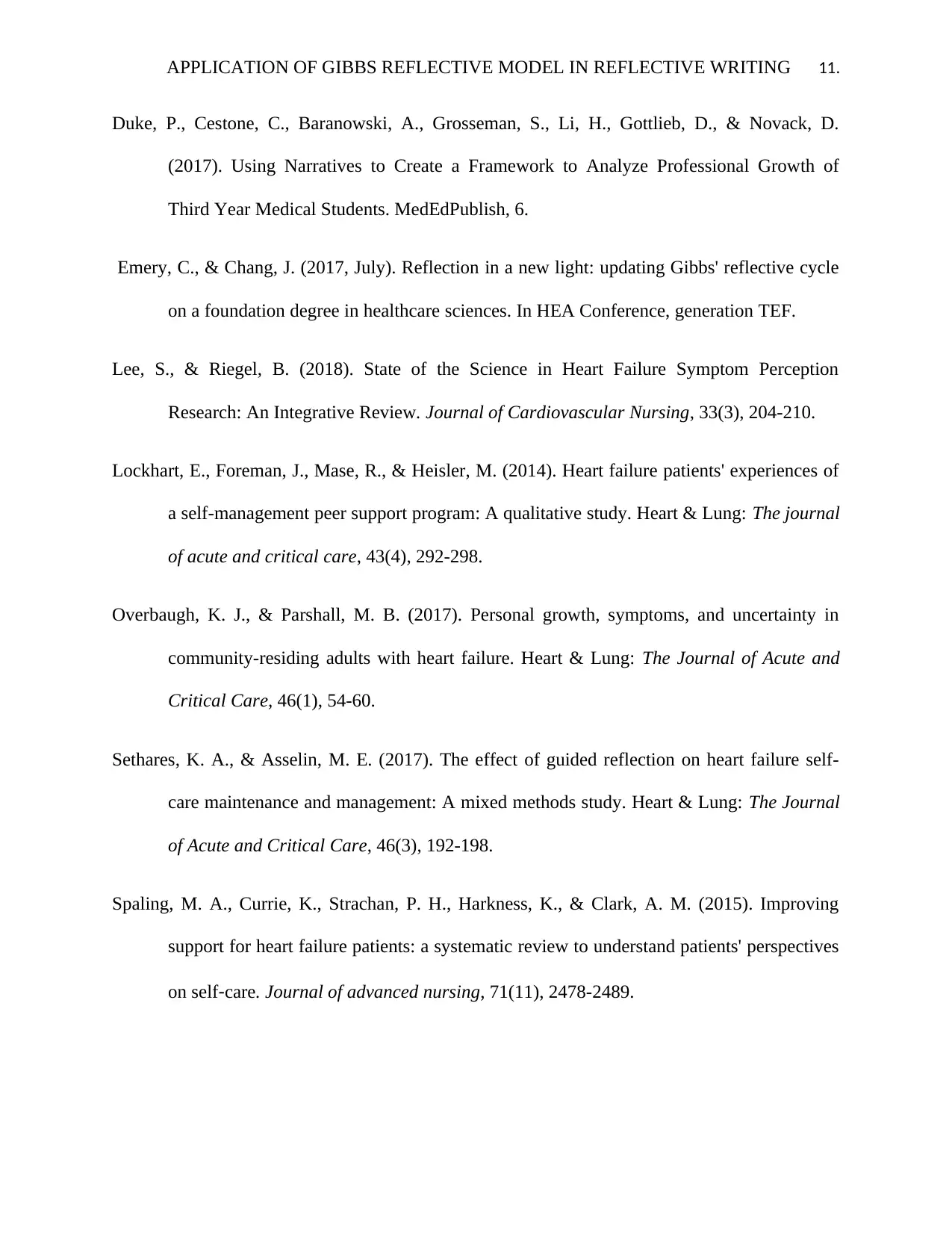
APPLICATION OF GIBBS REFLECTIVE MODEL IN REFLECTIVE WRITING 11.
Duke, P., Cestone, C., Baranowski, A., Grosseman, S., Li, H., Gottlieb, D., & Novack, D.
(2017). Using Narratives to Create a Framework to Analyze Professional Growth of
Third Year Medical Students. MedEdPublish, 6.
Emery, C., & Chang, J. (2017, July). Reflection in a new light: updating Gibbs' reflective cycle
on a foundation degree in healthcare sciences. In HEA Conference, generation TEF.
Lee, S., & Riegel, B. (2018). State of the Science in Heart Failure Symptom Perception
Research: An Integrative Review. Journal of Cardiovascular Nursing, 33(3), 204-210.
Lockhart, E., Foreman, J., Mase, R., & Heisler, M. (2014). Heart failure patients' experiences of
a self-management peer support program: A qualitative study. Heart & Lung: The journal
of acute and critical care, 43(4), 292-298.
Overbaugh, K. J., & Parshall, M. B. (2017). Personal growth, symptoms, and uncertainty in
community-residing adults with heart failure. Heart & Lung: The Journal of Acute and
Critical Care, 46(1), 54-60.
Sethares, K. A., & Asselin, M. E. (2017). The effect of guided reflection on heart failure self-
care maintenance and management: A mixed methods study. Heart & Lung: The Journal
of Acute and Critical Care, 46(3), 192-198.
Spaling, M. A., Currie, K., Strachan, P. H., Harkness, K., & Clark, A. M. (2015). Improving
support for heart failure patients: a systematic review to understand patients' perspectives
on self‐care. Journal of advanced nursing, 71(11), 2478-2489.
Duke, P., Cestone, C., Baranowski, A., Grosseman, S., Li, H., Gottlieb, D., & Novack, D.
(2017). Using Narratives to Create a Framework to Analyze Professional Growth of
Third Year Medical Students. MedEdPublish, 6.
Emery, C., & Chang, J. (2017, July). Reflection in a new light: updating Gibbs' reflective cycle
on a foundation degree in healthcare sciences. In HEA Conference, generation TEF.
Lee, S., & Riegel, B. (2018). State of the Science in Heart Failure Symptom Perception
Research: An Integrative Review. Journal of Cardiovascular Nursing, 33(3), 204-210.
Lockhart, E., Foreman, J., Mase, R., & Heisler, M. (2014). Heart failure patients' experiences of
a self-management peer support program: A qualitative study. Heart & Lung: The journal
of acute and critical care, 43(4), 292-298.
Overbaugh, K. J., & Parshall, M. B. (2017). Personal growth, symptoms, and uncertainty in
community-residing adults with heart failure. Heart & Lung: The Journal of Acute and
Critical Care, 46(1), 54-60.
Sethares, K. A., & Asselin, M. E. (2017). The effect of guided reflection on heart failure self-
care maintenance and management: A mixed methods study. Heart & Lung: The Journal
of Acute and Critical Care, 46(3), 192-198.
Spaling, M. A., Currie, K., Strachan, P. H., Harkness, K., & Clark, A. M. (2015). Improving
support for heart failure patients: a systematic review to understand patients' perspectives
on self‐care. Journal of advanced nursing, 71(11), 2478-2489.
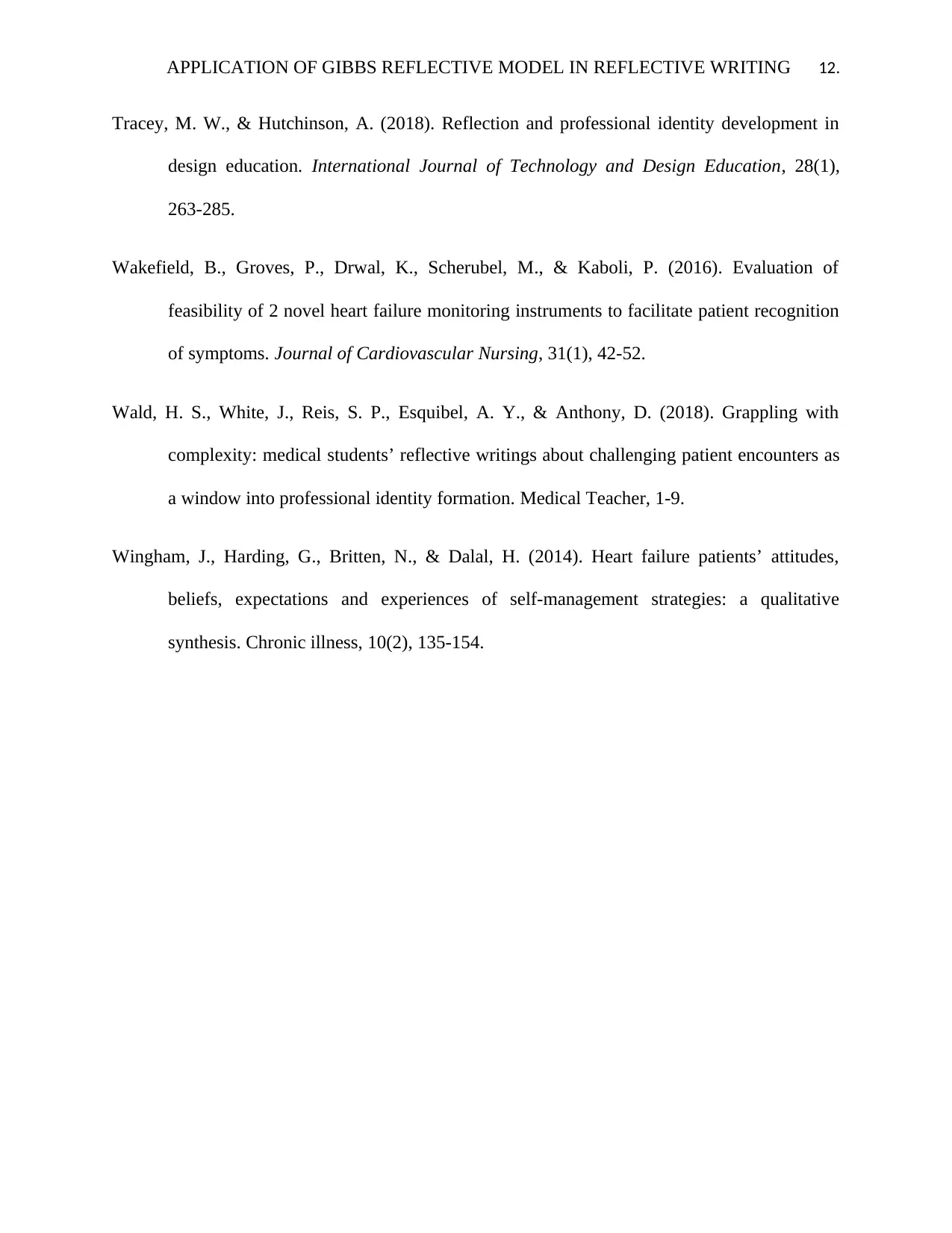
APPLICATION OF GIBBS REFLECTIVE MODEL IN REFLECTIVE WRITING 12.
Tracey, M. W., & Hutchinson, A. (2018). Reflection and professional identity development in
design education. International Journal of Technology and Design Education, 28(1),
263-285.
Wakefield, B., Groves, P., Drwal, K., Scherubel, M., & Kaboli, P. (2016). Evaluation of
feasibility of 2 novel heart failure monitoring instruments to facilitate patient recognition
of symptoms. Journal of Cardiovascular Nursing, 31(1), 42-52.
Wald, H. S., White, J., Reis, S. P., Esquibel, A. Y., & Anthony, D. (2018). Grappling with
complexity: medical students’ reflective writings about challenging patient encounters as
a window into professional identity formation. Medical Teacher, 1-9.
Wingham, J., Harding, G., Britten, N., & Dalal, H. (2014). Heart failure patients’ attitudes,
beliefs, expectations and experiences of self-management strategies: a qualitative
synthesis. Chronic illness, 10(2), 135-154.
Tracey, M. W., & Hutchinson, A. (2018). Reflection and professional identity development in
design education. International Journal of Technology and Design Education, 28(1),
263-285.
Wakefield, B., Groves, P., Drwal, K., Scherubel, M., & Kaboli, P. (2016). Evaluation of
feasibility of 2 novel heart failure monitoring instruments to facilitate patient recognition
of symptoms. Journal of Cardiovascular Nursing, 31(1), 42-52.
Wald, H. S., White, J., Reis, S. P., Esquibel, A. Y., & Anthony, D. (2018). Grappling with
complexity: medical students’ reflective writings about challenging patient encounters as
a window into professional identity formation. Medical Teacher, 1-9.
Wingham, J., Harding, G., Britten, N., & Dalal, H. (2014). Heart failure patients’ attitudes,
beliefs, expectations and experiences of self-management strategies: a qualitative
synthesis. Chronic illness, 10(2), 135-154.
⊘ This is a preview!⊘
Do you want full access?
Subscribe today to unlock all pages.

Trusted by 1+ million students worldwide
1 out of 12
Related Documents
Your All-in-One AI-Powered Toolkit for Academic Success.
+13062052269
info@desklib.com
Available 24*7 on WhatsApp / Email
![[object Object]](/_next/static/media/star-bottom.7253800d.svg)
Unlock your academic potential
Copyright © 2020–2026 A2Z Services. All Rights Reserved. Developed and managed by ZUCOL.





